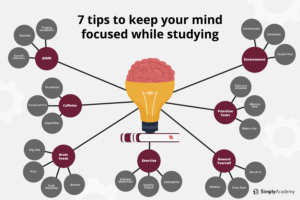7 tips to keep your mind focused while studying
18 April 2024

Juggling emails, phone calls, and a constant stream of notifications can make studying feel like an uphill battle. But fear not! The key to conquering these distractions lies in personalised learning strategies. Since everyone’s brains are wired differently, the most effective techniques will vary from student to student. By exploring different approaches, you can find out what method works best for you, so you can maximise your focus and optimise your study sessions.
Here at Simply Academy, we have compiled 7 different strategies known to help focus the mind and maximise learning potential.
1. Brain foods
The brain uses approximately 20% of your daily calories, which isn’t surprising given the critical role it plays in running the body. This is why feeding your brain with the right nutrients and ditching sugary energy drinks is key to boosting performance and maintaining focus.
Oily fish
Approximately 60% of the brain is made up of fat, with around 25% of that consisting of the omega-3 fatty acid, Docosahexaenoic Acid (DHA). DHA plays a vital role in brain development, function, and communication between brain cells. Oily fish such as salmon, tuna, mackerel, and herring contain DHA in abundance, which is why it’s so important to incorporate them into your diet. Observational studies have shown a link between eating oily fish and increased learning and memory, as well as higher cognitive performance.
Nuts
Like oily fish, nuts such as walnuts, almonds, and hazelnuts all contain omega-3 fatty acids. In addition to healthy fats, nuts contain a wealth of antioxidants, including vitamin E. Vitamin E plays a crucial role in protecting brain cells by neutralising free radicals (unstable molecules that can damage cells). Nuts are also a good source of B vitamins, which may help combat age-related cognitive decline.
Dark chocolate
Dark chocolate must legally contain 35% cocoa solids to be labelled as ‘dark chocolate’, however some varieties of dark chocolate contain as much as 100%. Cocoa contains a type of antioxidant called flavanols which some observational studies suggest is linked to improved blood flow and cognitive performance. So, it might be time to swap out your milk chocolate for something darker.
Berries
The vibrant colours of berries like blueberries, blackberries, and strawberries come from anthocyanins, a type of antioxidant. These anthocyanins not only give berries their beautiful hues, but are also anti-inflammatory and fight against free radicals. Improving the blood flow to the brain can help to increase the amount of oxygen and nutrients being delivered to the brain cells, in turn improving brain function and the ability to focus.
2. Caffeine
Caffeine is mostly consumed through beverages such as coffee, tea, and carbonated drinks. There are multiple reasons why caffeine is such a popular method to increase energy, concentration, and cognitive function.
Adenosine is a neurotransmitter which promotes feelings of tiredness. As the day goes on, adenosine levels increase and bind to the adenosine receptors, acting as a sleep signal to the brain. Caffeine has a similar structure to adenosine and also binds to the receptors, blocking the uptake of adenosine and preventing feelings of tiredness.
Alongside caffeine’s stimulatory effects, it also triggers the brain to release dopamine, norepinephrine, and glutamate.
- Dopamine – our brains release dopamine, a chemical messenger, to create feelings of pleasure and motivation. This dopamine surge reinforces rewarding behaviours, making us more likely to seek them out again.
- Norepinephrine – a neurotransmitter responsible for increased alertness, focus, and energy.
- Glutamate – the most abundant excitatory neurotransmitter in the brain which is responsible for facilitating brain communication, connection, and plasticity.
3. Listening to ASMR
ASMR stands for Autonomous Sensory Meridian Response and is triggered by listening to certain sounds, although what triggers this response varies depending on the individual. When experiencing ASMR, individuals often describe feelings of relaxation, stress reduction, and improved mood as well as physical effects such as tingling sensations, warmth and overall calmness.
Studies have shown that ASMR activates specific brain regions linked to reward and emotional regulation. This activation, particularly the release of dopamine, is thought to contribute to the pleasurable feelings associated with ASMR. To capitalise on this effect, thousands of online videos specifically trigger ASMR by incorporating popular elements like tapping, scratching, and whispering.
ASMR’s effects lend themselves to focusing the brain whilst studying. It doesn’t just put your mind into a relaxed state but also acts to filter out distracting noises in your environment.
4. Environment
The ideal study environment depends entirely on the individual learner. Some people work best in quiet spaces, limiting any external noise they perceive as distracting. Others prefer a busier atmosphere, believing some background noise can actually prevent their minds from wandering. Here are some general tips for creating the ideal study environment:
- Keep the space organised and clutter-free
Mess can be visually distracting, by keeping your study space organised and your study materials on hand you boost productivity and minimise the chance of distraction from the task at hand.
- Be comfortable
Being in discomfort is a huge distraction which can ultimately lead to physical distress, fatigue, and anxiety. Studying in a comfortable environment can increase productivity and motivation, allowing you to remain ‘in the zone’ for a longer period of time.
- Surround yourself with essentials
Having snacks and drinks within reach while studying offers a double benefit: it regulates blood sugar for sustained energy and minimises interruptions by reducing the need to leave your study space.
5. Prioritise tasks
Decision fatigue, also known as ego depletion, is a well-established concept in psychology. It suggests our brains have limited mental resources for decision-making. When overloaded with choices, these resources become depleted, leading to poorer decision-making, planning, and impulse control.
Understanding ways in which to minimise decision fatigue can ultimately help in maximising productivity whilst studying. Try prioritising tasks by making a list or schedule of what you need to do in the study session, relieving yourself of having to make these decisions as you go along. Starting with the most challenging or high-priority tasks first can boost motivation and give a sense of accomplishment as you tick them off the list.
Prioritisation is key to effective time management. By prioritising tasks, you can allocate an appropriate amount of time to each one, ensuring you don’t spend too much time on less important items. This helps you stay on track and prevents you from feeling overwhelmed by your overall workload.
6. Reward yourself
We’ve spoken a lot about dopamine in this article. This is because dopamine is referred to as the “reward chemical” and is released in the brain when we engage in activities which we deem as rewarding or pleasurable. Establishing a reward system for studying creates a powerful connection. The pleasure you associate with the reward becomes linked to the act of studying itself. This dopamine-fuelled loop motivates you to repeat focused studying, making it more likely you’ll stick with it in the long run.
To capitalise on this reward loop, choose rewards you can indulge in immediately after completing a task. This could be eating something you’ve been craving, watching an episode of your favourite show, or dedicating some time to a hobby. It’s also important to be mindful of your rewards. Choose options you can enjoy quickly and avoid anything too time-consuming that might make it hard to get back to studying!
7. Exercise
It’s well known that exercise does wonders for your body, but what about your brain? Studies have shown that regular exercise can improve memory, processing speed, and decision-making. Engaging in physical activity gets the heart pumping, which in turn increases blood flow to all areas of the body, including the brain. Blood delivers oxygen, glucose, and essential nutrients to the brain cells, facilitating their function and improving alertness. This rush of blood flow to the brain also stimulates the production of dopamine, norepinephrine, and endorphins, which produce feelings of well-being and reduced anxiety.
In addition to the effects that exercise has on the brain, engaging in physical activity promotes a healthy fatigue within the body as glucose is used up and lactic acid is produced. This leads to spending more time in slow-wave sleep, the period of deep sleep in which the body synthesises hormones and proteins to repair damaged cells.
Incorporate short bursts of moderate-intensity exercise between study sessions. This will stretch your legs, boost your energy, and improve blood flow to the brain, sharpening your focus. Consider incorporating exercise into your reward system too! A walk around your local park or to your favourite coffee shop can be a refreshing break and a well-deserved reward.
Remember, the most effective focus strategies are the ones that work for you. Your brain is a remarkable learning machine, but even the most powerful computers need optimisation. By incorporating these focus tips, you’re not just silencing distractions – you’re actively enhancing your brain function.




